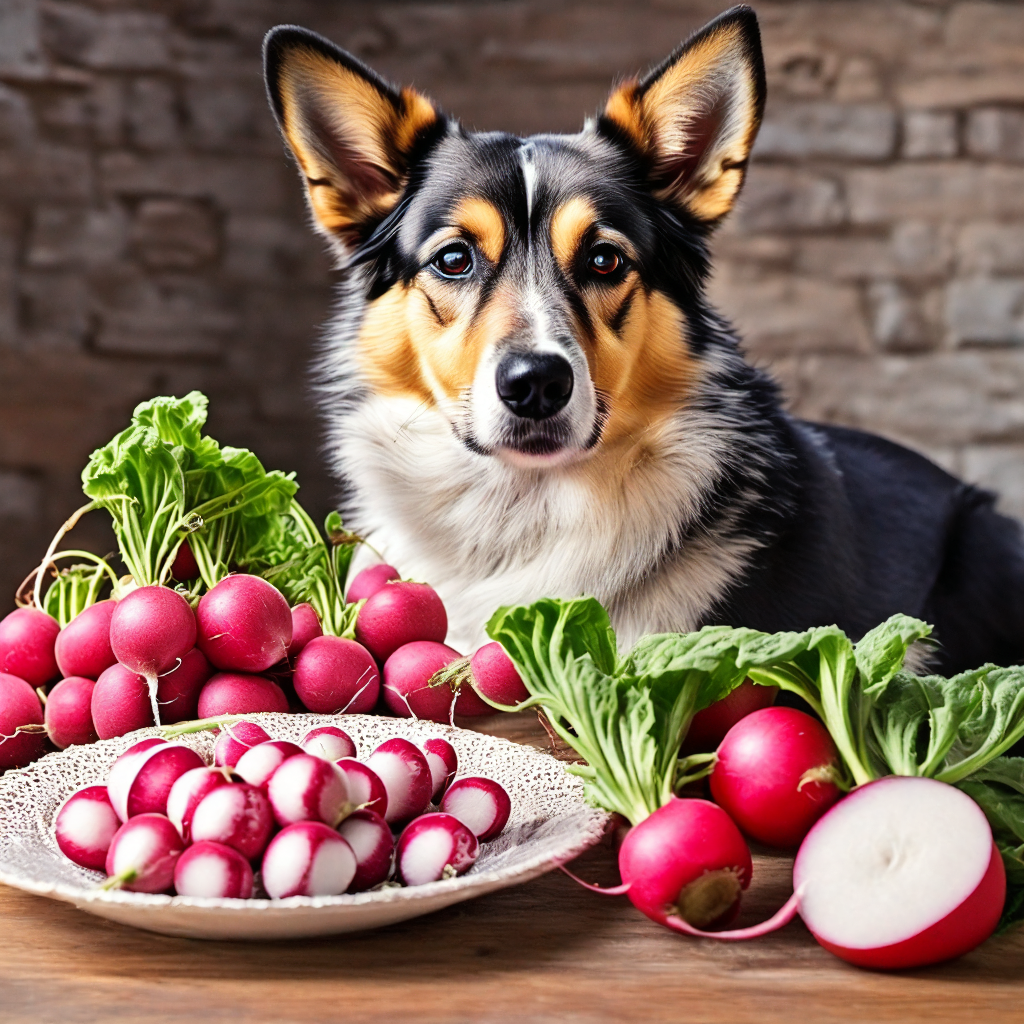Radishes are safe for dogs to eat in moderation. They are a crunchy vegetable that contains vitamins, minerals, and fiber that can benefit your dog’s health. Radishes are a non-toxic food for dogs, so you don’t have to worry about any harmful elements in them. However, as with any new food, it is important to introduce radishes slowly and in small, manageable portions to ensure that your dog can tolerate them.
Health Benefits of Radishes for Dogs
Radishes are a nutritious addition to your dog’s diet. They contain essential nutrients that can benefit your dog’s health. Here are the key nutrients found in radishes and their corresponding health benefits for dogs:
Did you know that chocolate can kill a dog?
One cup of sliced radishes provides approximately:
| Nutrient | Amount per 1 cup of sliced radishes |
|---|---|
| Calories | 19 |
| Carbohydrates | 4 grams |
| Dietary Fiber | 2 grams |
| Protein | 1 gram |
| Vitamin C | 29% of the recommended daily intake |
| Folate | 8% of the recommended daily intake |
| Potassium | 5% of the recommended daily intake |
| Magnesium | 3% of the recommended daily intake |
Key Nutrients Found in Radishes
- Dietary Fiber: Aids in Digestion
- Vitamin C: Boosts Immune System
- Potassium: Supports Heart Health
- Folate: Promotes Cell Repair and Maintenance
- Antioxidants: Combat Free Radicals
There are a few potential risks and concerns associated with feeding radishes to dogs:
| Risk/Concern | Description |
|---|---|
| Cruciferous vegetable | Radishes contain compounds that may cause digestive upset, including gas, bloating, and diarrhea. |
| Fiber content | Radishes are high in fiber, which can lead to digestive issues if consumed in large quantities. |
Nutrient Profile and Corresponding Health Benefits for Dogs
- Dietary Fiber: Radishes are a good source of dietary fiber, which can aid in digestion and promote regular bowel movements.
- Vitamin C: Radishes contain vitamin C, which can boost your dog’s immune system and help prevent illness.
- Potassium: Radishes are a good source of potassium, which can support heart health and regulate blood pressure.
- Folate: Radishes contain folate, which can promote cell repair and maintenance.
- Antioxidants: Radishes contain antioxidants, which can combat free radicals and help prevent cell damage.

Considerations When Feeding Radishes to Dogs
While radishes are safe for dogs to eat, there are some considerations to keep in mind. It is important to feed radishes to your dog in moderation and to start with a small slice or a few shavings. Remember that radishes should not constitute more than 10% of your dog’s daily caloric intake. Some dogs may find the peppery taste of radishes unsettling, so it is important to monitor your dog for any adverse reactions. Always cut the radish into small, digestible pieces to prevent choking hazards. Though rare, some dogs may be allergic to radishes, so it is important to monitor your dog for any allergic reactions.
How to Feed Radishes to Dogs
Radishes can be served to your dog either raw or cooked. Here are some different ways to prepare radishes for dogs:
- Finely grate radishes and mix them with your dog’s regular food.
- Cut radishes into small pieces and use them as a treat.
- Incorporate radishes into homemade dog treats, like the Artisanal Radish Canine Delicacies recipe provided in this guide.
When feeding radishes to your dog, it is important to introduce them slowly and in moderation to see how your dog reacts. You can also mix radishes with other dog foods, but ensure to introduce them separately initially.
Other Vegetables Dogs Can Eat
Radishes are not the only vegetable that is safe for dogs to eat. Here are some other vegetables that you can incorporate into your dog’s diet:
- Carrots: Promote Dental Health
- Cucumbers: Excellent for Hydration
- Sweet Potatoes: Rich in Vitamins and Fiber
- Green Beans: Good Source of Protein and Fiber
- Pumpkin: Aids in Digestive Health
Each of these vegetables has its own nutritional benefits for dogs. You can incorporate them into your dog’s diet by mixing them with their regular food or using them as a treat.
Conclusion
In conclusion, radishes are safe for dogs to eat in moderation and can offer numerous health benefits. They are a good source of dietary fiber, vitamin C, potassium, folate, and antioxidants. When feeding radishes to your dog, it is important to introduce them slowly and in moderation to see how your dog reacts. Always consult your veterinarian before introducing new foods into your pet’s diet.
Q: Can dogs eat radishes?
A: Yes, dogs can eat radishes.
Q: Are radishes safe for dogs?
A: Yes, radishes are safe for dogs to eat.
Q: Are radishes good for dogs?
A: Radishes can be a nutritious addition to a dog’s diet.
Q: What are the benefits of feeding radishes to dogs?
A: Radishes are a good source of fiber and provide vitamins and minerals.
Q: Can dogs eat all types of radishes?
A: Dogs can eat most types of radishes, including daikon radish and wild radish.
Q: How should radishes be served to dogs?
A: It is best to feed radishes to dogs in moderation as a snack or as part of their regular diet.
Q: Are there any risks of feeding radishes to dogs?
A: While radishes are generally safe for dogs, excessive consumption may cause an upset stomach.
Q: Can dogs eat raw radishes?
A: Yes, dogs can eat raw radishes without any issues.
Q: Are radishes toxic to dogs?
A: No, radishes are not toxic to dogs.
Q: Can I give my dog radish from my own plate?
A: It is safe to give your dog radish from your own plate, as long as it is not seasoned or cooked with toxic ingredients for dogs.
Hi, I’m John and I love dogs. Ever since I was a kid, I always wanted to have a furry friend by my side. I grew up with a golden retriever named Max, who taught me a lot about loyalty, friendship, and fun. He was my best buddy for 12 years, and I miss him every day.
